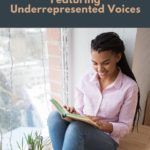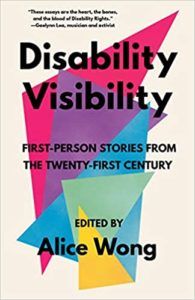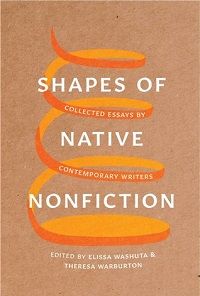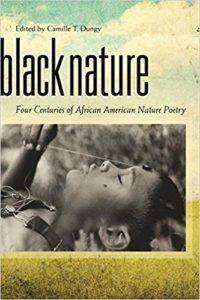Diverse and inclusive collections like these prove that there is no one “single story” within a groups of marginalized people. Their stories, their art, and their experiences are just as nuanced and varied as other writers’. These collections are just a starting place, but I hope you discover some new writers in these works:
Disability Visibility: First Person Stories from the 21st Century edited by Alice Wong
This is a collection of first-person essays from disabled writers about the richness and complexity they experience in day-to-day life. The collection truly demonstrates the vastness of disability culture because one in four people in the United States identify as disabled, and the perspective of people with disabilities is by no means a monolith. Wong is careful to include many points-of-view, making the entries truly intersectional.
The Good Immigrant: 26 Writers Reflect on America by Nikesh Shukla
This collection is a follow-up to the 2016 Good Immigrant collection that features the United Kingdom perspective. It features writers like Chigozie Obioma, Jenny Zhang, and Alexander Chee, all writing about their experiences with heritage and immigration in America. These stories are often about the tension of living between two cultures, two languages, and two homes, and how these writers seek belonging.
It’s Not About the Burqa: Muslim Women on Faith, Feminism, Sexuality and Race by Miriam Khan
Muslim women are often represented in predominantly white western media one singular way, as being “traditional” and “submissive.” Again, there is no room for them to have nuanced, individualistic points of view when they are represented in just one way. Miriam Khan pulls together pieces from 17 Muslim women and makes space for them to discuss family, feminism, identity, racism, and more, in their own words.
LGBTQ Fiction and Poetry from Appalachia edited by Jeff Mann and Julia Watts
Published in 2019, this is the first fiction and poetry collection featuring lesbian, gay, bisexual, transgender, and queer authors from Appalachia. The Appalachian region, which follows the Appalachian Mountain Range, is very large; it encompasses parts of 12 states from southern New York to northern Mississippi. According to the Appalachian Region Commission, 42% of the region’s population is rural, compared with 20% of the national population. This collection shares the ways these writers balance issues of family, religion, identity, and home across this unique and varied region.
Shapes of Native Nonfiction: Collected Essays by Contemporary Writers edited by Elissa Washuta and Theresa Warburton
This collection features 27 essays by contemporary Native writers who belong to many different tribal nations throughout the United States and Canada. The collection, inspired by traditional basket-weaving, is creative and lyrical in form and in the selections it pulls together.
Can We All Be Feminists? Edited by June Eric-Udorie
This is an intersectional collection of writing from seventeen different contributors on the topic of feminism. The essays cover why intersectionality is essential within the feminist movement, and why some women—including themselves sometimes—struggle to identify as feminist because other aspects of their identity are not traditionally centered within the feminist movement’s quest for gender equality.
Queer and Trans Artists of Color: Stories of Some of Our Lives interviews by Nia King, co-edited by Jessica Glennon-Zukoff and Terra Mikalson
This is a collection of conversational interviews, conducted by Nia King, with 16 other queer and trans artists of color. The conversations in the first collection range from dating, to politics, to gentrification, to privilege, and to self-care and more. This collection is a must read for artists or activists. There is also a Volume II, which was published in 2016, and I think there is a Volume III coming soon!
Black Nature: Four Centuries of African American Nature Poetry edited by Camille T. Dungy
Published in 2009, Black Nature was the first anthology of nature writing by Black poets. It features 180 poems from 93 poets spanning history from enslavement to the 21st century. Some of the selections feature famous voices like Phillis Wheatley and Gwendolyn Brooks, but there are also plenty of selections from lesser-known and contemporary poets. The collection shows that Black writers have a rich history of nature writing that has been ignored, or else categorized as other kinds of literature, such as political or protest poetry, due to the common misconception that Black people are disconnected from nature. These powerful poems show this is far from true. If you want to push yourself to read more widely, check out Boot Riot’s annual Read Harder Challenge for prompts and reading lists to expand your bookish horizons!



